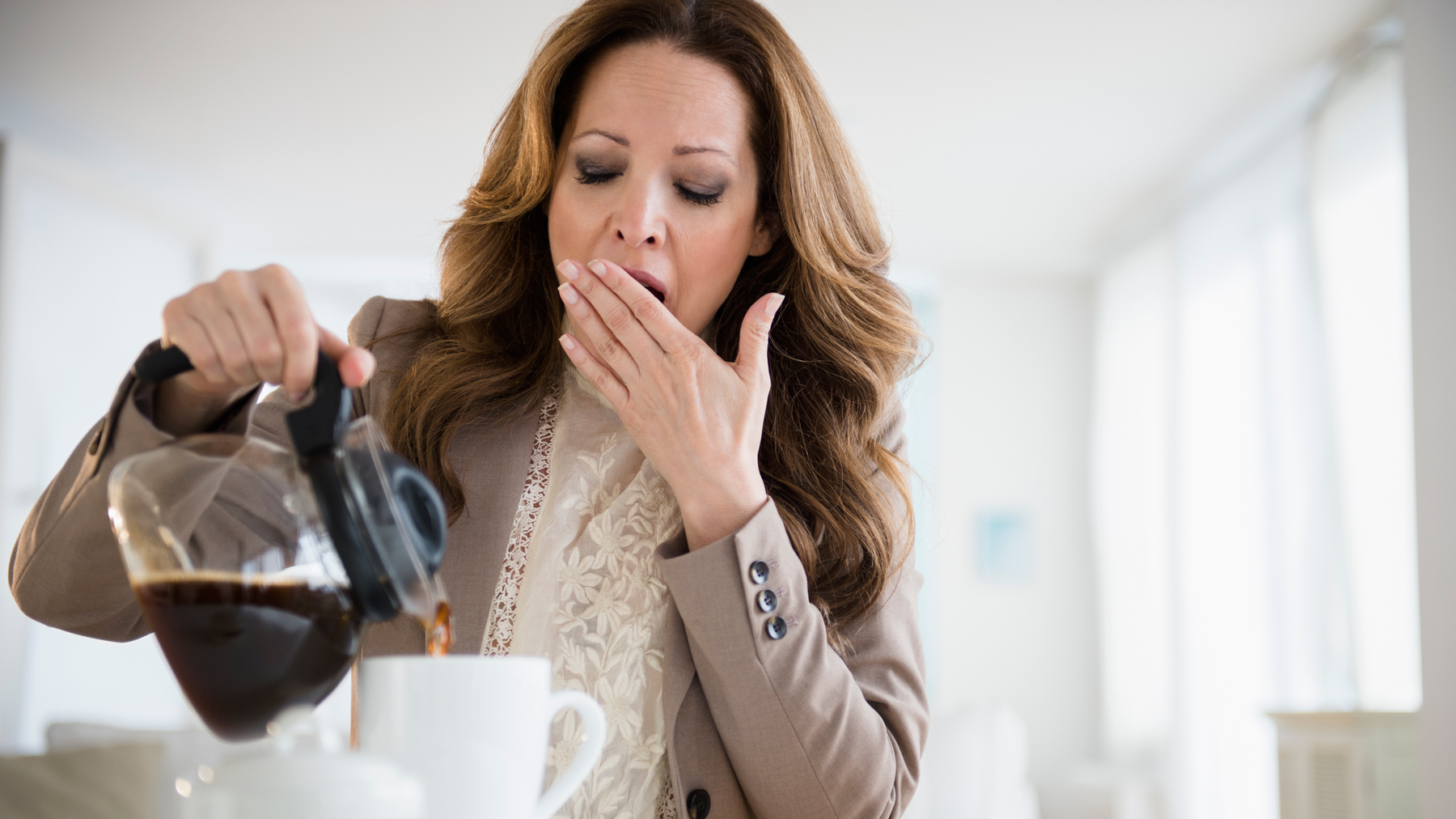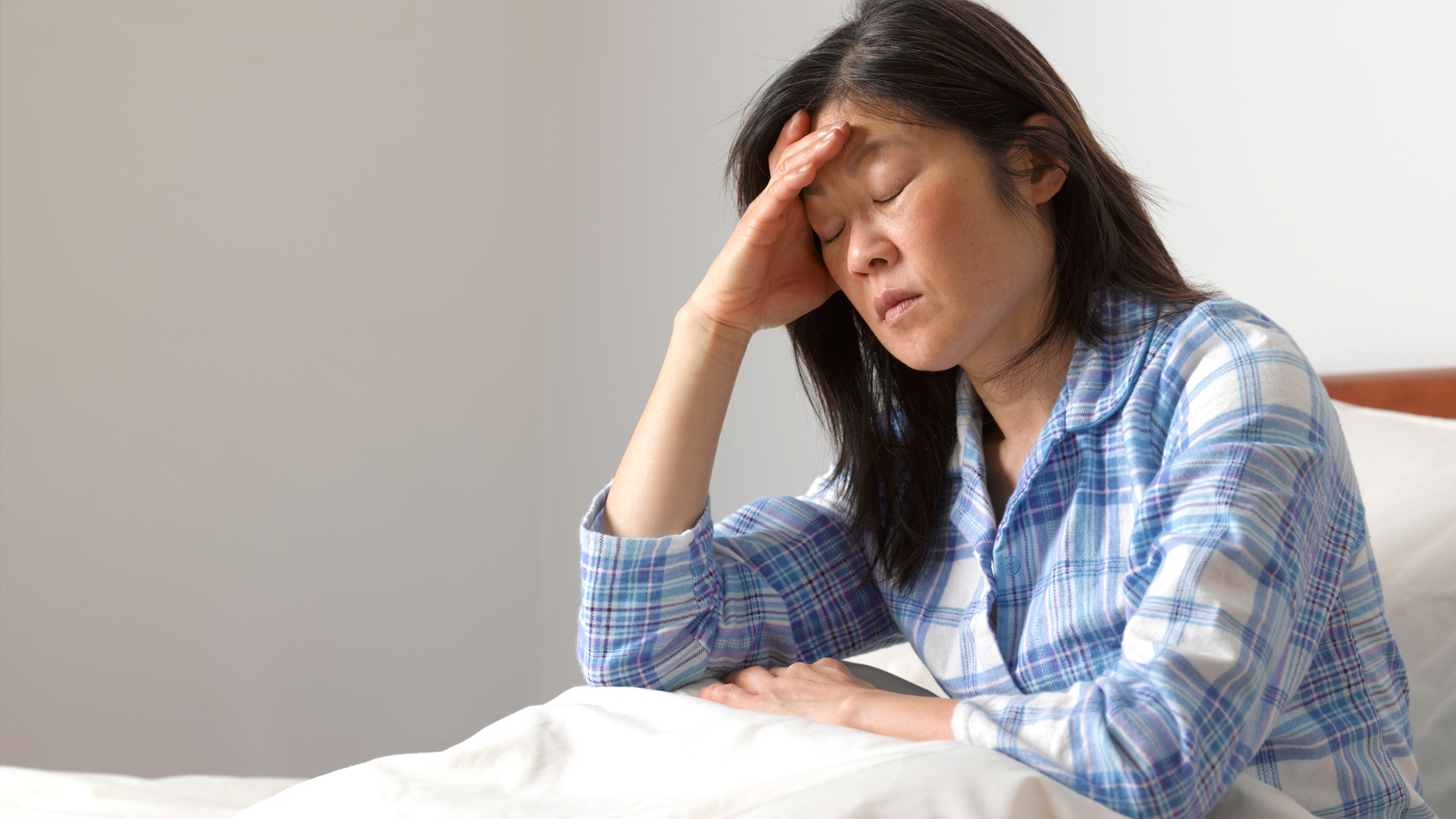Does menopause make you tired?
Does menopause make you tired? Here’s how to balance your hormones better to increase energy levels


Start your week with achievable workout ideas, health tips and wellbeing advice in your inbox.
You are now subscribed
Your newsletter sign-up was successful
Does menopause make you tired, and how can you manage this? It’s a very important question many women will want to know, especially if you’ve heard it discussed as a symptom of menopause. Or perhaps you already suffer from feelings of fatigue, and are worried about this heightening when you eventually go through the change yourself.
Menopause occurs when your ovaries stop producing as much of the hormone estrogen and when they stop releasing an egg every month. Hormones play a vital role in regulating energy production, so any changes in your hormones can also affect your energy levels. This is why some women can feel as though they lack energy as they go through menopause. Some of the best menopause supplements are recommended for menopausal women to help regulate hormones and symptoms. In addition to this, learning more about menopause and its effect on energy levels and tiredness can help you better combat this.
Menopause and hormone health expert, Nicki Williams, shared with us some expert knowledge on why menopause makes you tired, what impact the transition can have on your sleep, how long the lower energy levels can last and perhaps most importantly, ways to overcome fatigue during the transition. Diet can impact many areas of our lives, including our hormone levels, so we asked nutritional therapist Rosie Millen to share some top tips on what foods can help to boost your energy levels while going through menopause.
Why does menopause make you tired?
If you’re in the early stages of menopause (perimenopause), experiencing it now, or in the postmenopause era, it’s highly likely that the transition has affected your hormone levels. But if you're unsure if you're even experiencing menopause, we have a guide to all the menopause symptoms to help you out.
As your hormones change during menopause this upsets the usual rhythm and balance of your hormone activity. It’s not uncommon for your cortisol to be higher as a result of increased stress. Science has also found an association between stress and sleep during menopause. Research published in the Menopause journal concluded there is a relationship between stress and fatigue throughout menopause and that this will change throughout the different stages of the transition. Nicki Williams who has also written the book, It’s Not You, It’s Your Hormones – The Essential Guide for Women Over 40 to Fight Fat, Fatigue and Hormone Havoc, said that increased stress can impact your sleep and energy levels during the day.
Williams says, “Progesterone is declining and that can affect your sleep. Thyroid hormones can also be lower than optimal at this time, making you feel more sluggish. And if we are eating sugary food or refined carbohydrates, we can end up on the blood sugar roller coaster, which can leave you feeling tired, foggy, and cranky.”
Another reason you may be experiencing intense feelings of fatigue during menopause could be down to nutrient deficiencies. This can easily happen as your body goes through a big change, but this should give you a greater imperative to fix this. Ensuring you are getting plenty of iron, B12, and vitamin D is essential and you can also take some of the best vitamins for women over 50 to take extra care of your body as you age.
Start your week with achievable workout ideas, health tips and wellbeing advice in your inbox.

Does menopause affect your sleep and if so how?
According to Sleep Foundation, one in four women experience symptoms of insomnia, and the risk of insomnia increases with menopause. They state that 61% of postmenopausal females report having insomnia symptoms.
It’s pretty clear that menopause can disrupt sleep. Williams confirms this when we speak to her:
“Progesterone has a calming effect on the brain so it helps with sleep quality and anxiety symptoms. Sleep issues can also be due to high cortisol (stress), high insulin (back to that blood sugar balance!), dehydration, too much caffeine or alcohol, and low melatonin (your sleep hormone),” said Williams.
Will menopausal tiredness last?
It will last but only until you find out exactly what’s causing it and are proactive about trying to amend this. Fatigue is a clear sign that something in your body is out of balance, whether you’re going through menopause or not.
Williams advises you start looking at your hormones so that they can work optimally without draining you. Her key tips are to eat a nutrient-dense diet, drink plenty of water, rest and sleep sufficiently, move regularly, and limit toxins (such as synthetic chemicals and processed foods). These will all help to balance your hormones and get you on the right track for feeling more energized and perky again.
Research published in The Journal of the North American Menopause Society has also proven that moderate to high-intensity exercise is associated with increased energy levels for menopausal women. Physical activity might be the last thing you want to do if you’re feeling sluggish all the time but finding the right exercise is key - find out more about the best menopause exercises to help alleviate symptoms like fatigue.

Menopausal nutrition - what foods can combat tiredness?
If menopause is exhausting you, it’s important you turn to your diet since food plays a crucial role in energizing our bodies. Like Williams mentioned before, nutrients are essential. A woman’s bones begin to thin faster than usual when estrogen starts to decline during menopause. Therefore, you should aim to eat more calcium-rich foods which can be dark leafy greens like spinach and kale, also turnips, collard greens, and soya beans are good sources of calcium.
Registered nutritionist Rosie Millen tells Fit&Well that vitamin D is essential for absorbing and using calcium. “So, it makes sense that if you need more calcium, you also need more vitamin D. Low energy or fatigue is a common symptom of vitamin D deficiency. You can find sources of vitamin D in salmon, tuna, eggs, and fortified foods,” she adds.
Another top nutritional tip from Millen is to make sure you’re consuming plenty of protein-rich foods. You may be wondering, does protein give you energy? Technically this isn’t its main role (unlike carbohydrates, which our bodies process more easily for energy) but nutritional therapist Rosie Millen explains that protein will help to stabilize your blood sugar levels and manage your energy throughout the day.
Eating foods like eggs, salmon, turkey, and quinoa with every meal can help to steer you away from highly processed sugary foods that can trigger blood sugar crashes and energy drops. If you don’t think you consume enough protein-rich foods day-to-day then you can always add one of the best protein powders for women to things like smoothies or even a pancake mixture.
You might also notice a positive change in energy levels when you limit your caffeine intake. This is a tough one for any coffee addicts, but there’s always decaf options available in grocery stores and coffee shops. Millen says that caffeine meddles with blood sugar and cortisol levels, so it's good to avoid coffee if you’re feeling fatigued. She warns that caffeine can increase some menopause symptoms, so stick to one cup a day where possible.
Plus drinking coffee after 2 pm or six hours before bed can prevent the release of melatonin (this manages your natural sleep pattern) and cause you to feel restless when trying to get to sleep.
Jessica is an experienced fitness writer with a passion for running. Her career in journalism began in local news and she holds a Masters in journalism. Jessica has previously written for Runners World, penning news and features on fitness, sportswear and nutrition.
When she isn't writing up news and features for Fit&Well covering topics ranging from muscle building, to yoga, to female health and so on, she will be outdoors somewhere, testing out the latest fitness equipment and accessories to help others find top products for their own fitness journeys. Her testing pairs up nicely with her love for running. She recently branched out to running 10Ks and is trying to improve her time before moving on to larger races. Jessica also enjoys building on her strength in the gym and is a believer in health and wellness beginning in the kitchen. She shares all of this on her running Instagram account @jessrunshere which she uses for accountability and for connecting with like-minded fitness lovers.
